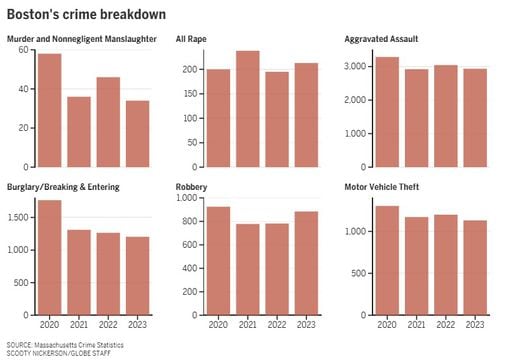Perhaps the most remarkable shift in the last several years has been the major decline in homicides. From 2012 to 2023, the city’s homicide rate plunged by 37 percent, according to the data, although there were some notable spikes during the COVID-19 pandemic.
Early reports from this year suggest that homicides could dip even further. So far in 2024, there have been just seven homicides reported by the Police Department. Last year, there were already 22 homicides by July 14, which, at the time, was also considered significantly below average.
As for why this is happening, James Alan Fox, a criminology and public policy professor at Northeastern University, pointed to some possible factors: the city’s relatively low gun ownership rate, aging population, and robust hospital network capable of treating gunshot victims effectively. How rapidly and effectively hospitals can treat gunshot wounds can sway whether an incident becomes a murder or an aggravated assault.
Jeff Asher, cofounder of AH Datalytics, which tracks crime data nationally, said the plunge in homicides and other shifts in crime are all “very much up for debate.”
“We don’t really understand fully why murder fell in the ’90s,” he said.
While declining homicides is certainly good news for the city, it shouldn’t be counted on to last forever, experts cautioned. Fox said crime trends often adhere to something called “criminological gravity” — whenever there is a huge decline or spike in crime, things tend to revert back to the average within a few years.
Looking at other crimes, car theft and home burglaries in Boston have also dropped over the last few years. Burglaries fell nearly 32 percent from 2020 to 2023 and car theft declined by over 13 percent.
However, not all crime types have trended down. Property crime in general ticked up slightly last year, driven by spikes in certain crimes like shoplifting and computer hacking. But overall, the numbers are still down compared to what they were in 2020.
In terms of the recent increases to property crime, Fox said that it may just come down to the reopening of the economy as fears of the pandemic have waned. More open stores means more potential for shoplifting.
Fox also said that one important factor that’s kept a lid on crime in Boston is the Police Department. He said the department has stayed responsive to incidents, even as the pandemic and Black Lives Matter protests influenced policing across the nation.
“My sense was that a lot of other police departments were a lot more reluctant to respond to calls unless they were extremely serious, to reduce the number of interactions with people,” Fox said. “I didn’t get the sense that they [the Boston police] were standing back.”
In a statement, Police Commissioner Michael Cox said there’s probably not enough data to say exactly why homicides and some other types of crime have trended down. But he believes the department has found success by blending data-driven policing with local community engagement.
“When we listen to our residents and use resources where they tell us they need support, the public partners with us by participating in public safety and that makes a tremendous difference,” he said.
Scooty Nickerson can be reached at scooty.nickerson@globe.com.











